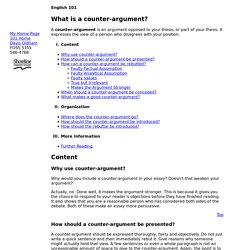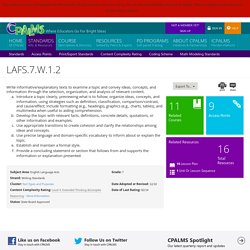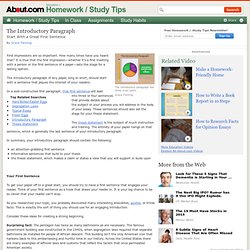

Learn Chinese Online. Identifying & Assessing Arguments. What is a Counter-Argument. A counter-argument is an argument opposed to your thesis, or part of your thesis.

It expresses the view of a person who disagrees with your position. Content Organization More Information Further Reading Content Why use counter-argument? Why would you include a counter-argument in your essay? Actually, no. Top How should a counter-argument be presented? A counter-argument should be expressed thoroughly, fairly and objectively.
Make sure you express the counter-argument fairly and objectively. Obviously, if you really believe the position expressed in your thesis, you will not be able to be completely objective in how you express the counter-argument—but you should try. How can a counter-argument be rebutted? One of the most effective ways to rebut a counter-argument is to show that it is based on faulty assumptions. All of these examples use a claim from James Loewen’s book, Lies My Teacher Told Me. Faulty Factual Assumption Top Faulty Analytical Assumption Faulty Values True but Irrelevant Top. How to Write an Argumentative Essay - Editing. CPALMS Resource: LAFS.7.W.1.2 - Write informative/explanatory texts to examine a topic and convey ideas, concepts, and information through the selection, organization, and analysis of relevant content.
The website is not compatible for the version of the browser you are using.

Not all the functionality may be available. Please upgrade your browser to the latest version. Write informative/explanatory texts to examine a topic and convey ideas, concepts, and information through the selection, organization, and analysis of relevant content. Subject Area: English Language Arts Grade: 7. Web Resource - Writing Skill Lessons - ReadWriteThink. How to write introductory paragraphs - Video. Rhetorical Appeals Commercials. How to write a hook. How to write a thesis for beginners. Write a thesis statement for an argumentative essay. Write an introductory paragraph for an argumentative essay. Homework Help - Writing Sentences and parahgraphs. Posted by Crystal on Wednesday, February 18, 2009 at 11:55pm.

You’ve applied for a specific job in your field of study. The Human Resources Department arranges an interview and tells you to bring with you a polished piece of writing for them to evaluate your writing skills. The paragraph must describe one particular experience you’ve had that inspired you or guided you to choose the type of position for which you applied. Your audience is your potential employer and your purpose is to show you have thought carefully about what and/or who has motivated you toward this career choice and why. In addition, you want to convey your enthusiasm for this position as it relates to your inspiring experience. 1. I worked for a In Home Care Provider and my position was eliminated after 8 years. so I went back to school. Here is what i have so far... Writing Sentences and parahgraphs - Writeacher, Thursday, February 19, 2009 at 7:48am Is this your freewriting? Answer this Question Related Questions. Principles of Composition. First Sentences or Paragraphs #1: Mary Miller Edition.
20 Great Opening Lines to Inspire the Start of Your Story. By Mark Nichol As Glinda the Good Witch says in The Wizard of Oz, “It’s always best to start at the beginning.”

That’s where editors and literary agents generally get going, so perhaps you should, too. Here are some strategies, accompanied by exemplars from literature, for making the first line of your novel or short story stand out so that the reader can’t help but go on to the second and the third and so on to see what else you have to say: 1. Absurd “‘Take my camel, dear,’ said my Aunt Dot, as she climbed down from this animal on her return from High Mass.” — Rose Macaulay, The Towers of Trebizond Are you in the mood for amusement? 2. “The human race, to which so many of my readers belong, has been playing at children’s games from the beginning, and will probably do it till the end, which is a nuisance for the few people who grow up.” — G. 3.
“The sky above the port was the color of television, tuned to a dead channel.” — William Gibson, Neuromancer 4. 5. “Justice? 6. Ho-hum — huh? 7. Introductory Paragraph - How to Write a Strong Introduction. First impressions are so important.

How many times have you heard that? It is true that the first impression—whether it’s a first meeting with a person or the first sentence of a paper—sets the stage for a lasting opinion. The introductory paragraph of any paper, long or short, should start with a sentence that piques the interest of your readers.